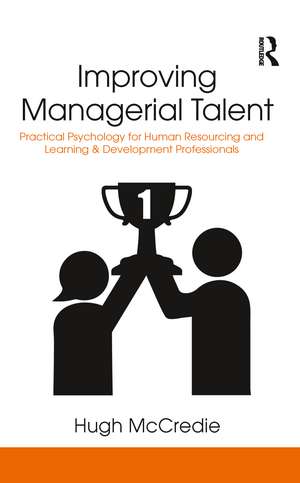Improving Managerial Talent: Practical Psychology for Human Resourcing and Learning & Development Professionals
Autor Hugh McCredieen Limba Engleză Paperback – 31 mar 2021
The book provides the reader with some self-insights and an appreciation of validated, powerful, often in-house, methods for selecting and developing better managers. The methods on offer have been validated on a population of over 400 directors of small to medium-sized business units. They include a generic psychometric algorithm for the selection of managers, some unique findings on styles of managing, coaching and persuading based upon close observation of over 200 senior managers and a distinctive and powerful approach to developing interpersonal skills by (1) practice, (2) demonstration of alternatives and (3) reflection.
| Toate formatele și edițiile | Preț | Express |
|---|---|---|
| Paperback (1) | 313.60 lei 43-57 zile | |
| Taylor & Francis – 31 mar 2021 | 313.60 lei 43-57 zile | |
| Hardback (1) | 762.58 lei 43-57 zile | |
| Taylor & Francis – 27 noi 2017 | 762.58 lei 43-57 zile |
Preț: 313.60 lei
Nou
Puncte Express: 470
Preț estimativ în valută:
60.01€ • 62.81$ • 49.95£
60.01€ • 62.81$ • 49.95£
Carte tipărită la comandă
Livrare economică 31 martie-14 aprilie
Preluare comenzi: 021 569.72.76
Specificații
ISBN-13: 9780367787684
ISBN-10: 0367787687
Pagini: 156
Dimensiuni: 156 x 234 x 8 mm
Greutate: 0.23 kg
Ediția:1
Editura: Taylor & Francis
Colecția Routledge
Locul publicării:Oxford, United Kingdom
ISBN-10: 0367787687
Pagini: 156
Dimensiuni: 156 x 234 x 8 mm
Greutate: 0.23 kg
Ediția:1
Editura: Taylor & Francis
Colecția Routledge
Locul publicării:Oxford, United Kingdom
Public țintă
Postgraduate, Professional, and Professional Practice & DevelopmentCuprins
Introduction; PART I: RECOGNISING AND SELECTING MANAGERIAL TALENT; Section 1. What contributes to overall managerial performance?; A suggested model; Section 2. What type of evidence will be considered?; Mental abilities, personality traits and personal competencies of average and high performing managers; Section 3. Mental abilities and personality traits; An overview of general mental ability and the Big Five personality traits and how these are distributed across the general population; Section 4. General mental ability; Do managers need to be intelligent?; Section 5. Extraversion; Do managers need to be extraverted?; Section 6. Agreeableness; Do managers need to be agreeable?; Section 7. Extraversion and Agreeableness in combination: Possible risks; Section 8. Conscientiousness; Do managers need to be conscientious?; Section 9. Agreeableness and Conscientiousness in combination: Possible risks; Section 10. Neuroticism (aka Emotional variability) or Stability?; Do managers need to be stable?; Section 11. Extraversion and Emotional variability in combination: Possible risks; Section 12. Openness; Do managers need to be open-minded?; Section 13. Summarising the mental ability and personality of managers; Including differences amongst the key business functions; Section 14. Harnessing personality and IQ test scores to guide selection; A worked example; Section 15. Recognising potentially dysfunctional personalities; A need for caution; Section 16. Leadership and personality: A review of research; Section 17. Is personality stable or ‘plastic’?; Accept it or change it?; Section 18. Moving on to personal competencies; Sixteen competencies into four common competency clusters; Section 19. Competency clusters and overall managerial performance; Some impressive connections; Section 20 . Drawing the threads together; Intelligence, personality, competencies and overall performance. Do we need to measure the first two if we have competency ratings?; Section 21. Performance in Key result areas; The missing link between competency and overall performance. The assessment domain most familiar to line managers; PART II: BEHAVIOURS AND STYLES; Section 22. Management behaviours; The interactive behavioural habits of average and high performing managers; Section 23. Behavioural styles; Telling or asking?; PART III: DEVELOPING MANAGERIAL TALENT; Section 24. Developing managerial talent; An overview; Section 25. Coaching around competencies; A performance coaching process based on a practice-demonstration-reflection learning design model; Section 26. Coaching for interpersonal competencies: Briefing; With a worked example; Section 27. Coaching for interpersonal competencies: Reviewing; With a worked example; Section 28. Developing line manager coaching skills; An outline approach and difficulties addressed; Section 29. Using contrasting ask/tell styles to develop interpersonal competency; Telling and asking styles; Section 30. Quick coaching; With a worked example; Section 31. High intensity training in influencing and persuasion; Based on the practice-demonstration-reflection learning design model; Section 32. The ‘win-win’ perspective; A strategic approach to influencing and persuasion; PART IV: IMPROVING MANAGERIAL TALENT: Reflections and Summary; Section 33. Is management right for you?; Useful to know when seeking to recognise, select and develop managerial talent in others; Section 34. How to recognise potential, select and help develop effective managers; A final summary and conclusion; Notes; Bibliography; Appendix; Index
Descriere
Aimed at senior HRM and L&D specialists responsible for improving their organisation’s managerial talent, the book covers the core findings of the author’s and other published research. It provides a highly participative overview of personality and ability psychometrics, involving the opportunity for self-application. It reveals hard evidenc
